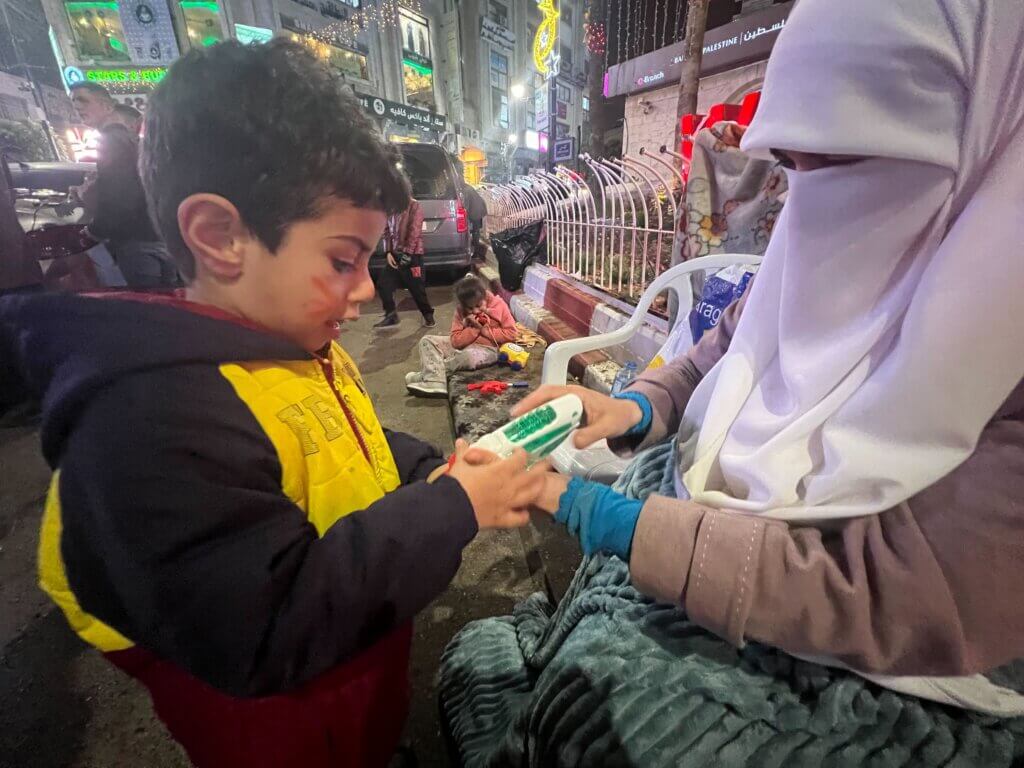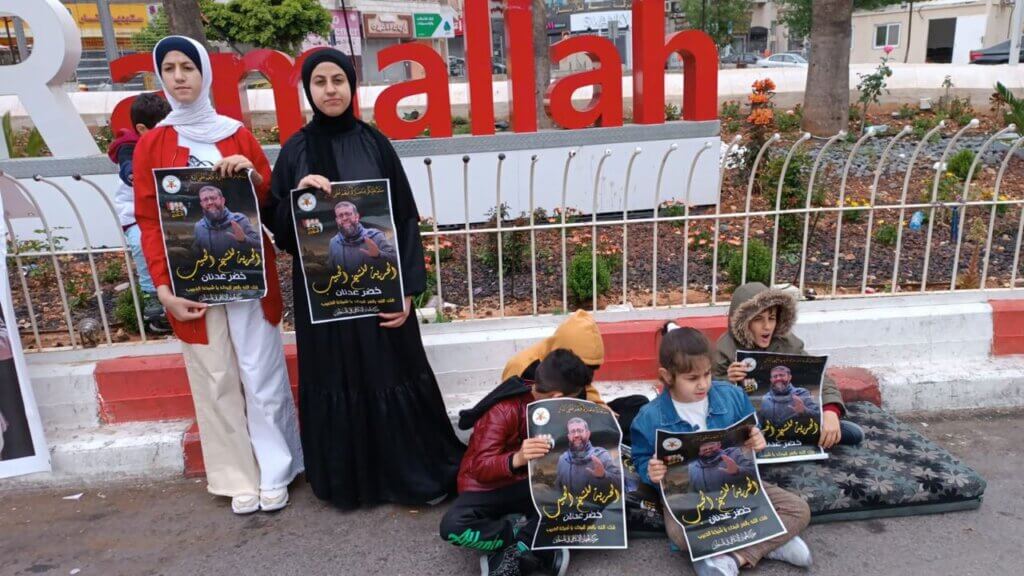On April 24, Palestinian hunger-striker and political activist Khader Adnan, 45, fainted on camera during his military court hearing.
“The few words he could say during the hearing were ‘I want to speak with Randa,’ but immediately after that the video conference was cut off and the screen turned black,” 41-year-old Randa Moussa, Adnan’s wife, told Mondoweiss.
For almost 81 days, Khader Adnan has been on hunger strike, protesting his political detention by Israel. Despite medical concerns for his life, Adnan continues to be held in Ramleh prison hospital.
“I am afraid this time,” Moussa said as she reflected on her husband’s condition. “This time is not like the other times, this time he is feeling the toll that all the previous hunger strikes have had on him.”
On the eve of the Eid al-Fitr holiday on April 21, Moussa hauled herself and Adnan’s nine children from Arrabah, 12 kilometers southwest of Jenin, and brought them to Ramallah, almost 140 kilometers away.
“When we came here, it was a painful feeling,” Moussa explained as she sat on a plastic chair at a rally for Adnan in the middle of downtown Ramallah, a few kilometers away from the Palestinian Authority’s headquarters. “We did not wake up at dawn to simply sit here on the sidewalk,” she explained to Mondoweiss. “We’re here for the purpose of sending a message,” she said.
A dozen arrests and several hunger strikes later
Sheikh Khader Adnan is from the town of Arrabah in the Jenin district. He and his wife, Randa, have nine children. The youngest, Zainab, is a year and a half, while the eldest, Maali, is 14. Adnan is publicly affiliated with the Palestinian Islamic Jihad (PIJ), the militant political group formed by Palestinian students in the 1980s in Egypt.
The PIJ and its members have become the primary target of Israeli extrajudicial assassinations ever since early 2022, as the PIJ has been implicated in fomenting and encouraging the rise of armed resistance groups in the West Bank, especially in cities like Nablus and Jenin. Unlike Adnan’s previous arrests, which were often arbitrary and conducted without charge or trial, Israel has presented an indictment list against the 45-year-old.
“The court has collected 25 confessions against him,” Moussa explained to Mondoweiss. “These are confessions which say he is a leader in the PIJ and an activist in the case of Palestinian detainees and in leading chants at protests,” she continued.
Adnan is not an armed combatant. If he were, he would be an occupied person exercising his right to resist an illegal occupation with arms and hence would have to be conferred the status of Prisoner of War (POW). Yet Adnan is being charged on two counts: association with a political organization, and participation in nonviolent protests against Israeli crimes against humanity — which is to say, he is being tried for political affiliation and political engagement, rights enshrined in international law.
“This detention was very difficult for Khader,” Moussa explained as their son, Omar, ran around with a water gun through the bustling streets of Ramallah on the eve of the Muslim holiday. “Many pressures were placed on Khader,” she continued. “He was taken for more than 38 days to the Jalameh interrogation center and its cells.”

The Jalameh interrogation center and its medical facilities have a history of abuses and, in some cases, have caused the death of Palestinian detainees. In November 2019, Sami Abu Dweik died in the custody of the Israel Prison Services at the Jalameh Medical facility. Another five Palestinian detainees also died that year inside Israeli prisons due to intentional negligence by Israeli military personnel and doctors.
Yet the punishment Israel is enforcing on Adnan is not limited to him. His family and children faced military harassment on the night of Adnan’s arrest on February 5. “They invaded our home in such a barbaric manner,” Moussa tells Mondoweiss, recalling the February invasion in which Adnan was arrested. “Our house is three floors, and as they entered the house, they bombed the first floor and second floor as a way of inflicting terror and scaring the children in the house,” she said.
“They would take a closet and throw it, take the shelves from inside it and throw it,” Moussa continued to describe the February evening. “The couches, they ripped them all up from the bottom.”
As the soldiers ransacked their house, the commander threatened Moussa after Khader Adnan told them that he didn’t have a phone on him. “The [commander] started yelling at me, ‘I will destroy your whole house,’” she said. “I responded to him: ‘Go for it, the house needs a change anyway.’”
“Despite it all, I kept my eyes on Khader because I was afraid for him,” Moussa continued as she described the raid and arrest of February 5.
Her concerns were not without warrant. Earlier on the night of Adnan’s arrest, the couple had been in the hospital due to gastrointestinal complications from which Adnan had been suffering, with a possibility of internal bleeding in the stomach as well as irregular blood pressure.
“The Israelis had done a surgery for him, he had 12 stitches then,” Moussa said, explaining that these were the consequences of one of Adnan’s previous hunger strikes in 2011-2012, in which both Adnan’s intestines and stomach were damaged.
After two more extended hunger strikes in 2015 and 2018, he underwent gallbladder surgery and surgery for bowel adhesions. In 2021, he went on yet another hunger strike for 25 days, in which he faced another setback in his health and was left in the ICU for three days. Each of those hunger strikes were protesting his imprisonment at different points over the years.
Yet Israeli soldiers’ only concern was criminalizing Adnan and terrorizing his family during his most recent arrest.
“The commander took the children, all nine, and put them in the bedroom, and kept Khader in the living room,” Moussa recalled. “[The commander] began to explain to [the children], saying ‘your father is a terrorist,’ ‘your father trades in blood,’ ‘your father sends people to kill Jews,’ ‘your father incites against Jews.’ He made sure Khader would hear him from the adjacent room,” Moussa said.
Starving for freedom
Adnan has already been arrested 12 times by the Israeli military before his most recent arrest on February 5, and was also once arrested by the Palestinian Authority (PA) in 1998. During several of those arrests, he become the veteran of several hunger strikes, most of them launched by him individually, and some of them as part of larger collective hunger strikes. Most of his hunger strikes won him his freedom from administrative detention, the act of imprisoning Palestinians without charge or trial.
In recent Palestinian history, hunger strikes have been carried out as a form of protest, either by individual prisoners or collective hunger strikes of groups of prisoners. Many of these strikes were carried out with the objective of Palestinians wresting control over their lives and bodies. In these circumstances, the slow and gradual depletion of their physical health becomes a battle of wills, the end point of which is guided not by the inevitability of death but by the prospect of surviving long enough to be free, even if it means having to suffer from new physical ailments, so long as it is not while being chained to a concrete wall.
But hunger strikers are not only faced with the adversity of nutritional deprivation but must also endure the relentless pressures and mistreatment of the Israeli prison authorities.
“The Israeli courts will keep Khader in the Ramleh prison hospital,” Moussa explained to Mondoweiss. “The reason they are keeping him in prison is in the event that they need to force-feed him, because doctors at other Israeli hospitals will not agree to force-feeding, but in prison they do,” she said.



I suppose Francesca Albanese will be smeared if she dares to speak out against the illegal detention of Khader Adnan. Or if she speaks of his childrens’ terrifying experience of being separated from both parents to hear blatant lies about their father, yelled at them, after watching their home being ransacked by soldiers of the “moral army”. When is the UN going to do what we the citizens of the world thought it was created for, when is it going to stand up for the human rights of all people, not simply the human rights of those the US will permit? What a flawed world we live in.